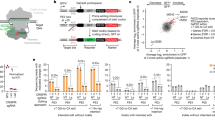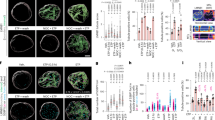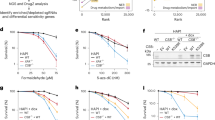Abstract
THE RAD3 gene of Saccharomyces cerevisiae is required for excision repair of ultraviolet-damaged DNA and is essential for cell viability1. The RAD3-encoded protein shares a high degree of homology with the human ERCC2(XPD) gene product2. Mutations in XPD, besides causing the cancer-prone syndrome xeroderma pigmentosum, can also result in Cockayne's syndrome and trichothiodystrophy3. To investigate the role of RAD3 in viability, we examine here the effect of a recessive, temperature-sensitive (ts) conditional lethal mutation of the gene on transcription by RNA polymerase II. Upon transfer to the restrictive temperature, the rad3-ts mutant rapidly ceases growth and poly(A)+ RNA synthesis is inhibited drastically. Messenger RNA levels of all the genes examined, HIS3, TRP3, STE2, MET19, RAD23, CDC7, CDC9 and ACT1, decline rapidly upon loss of RAD3 activity. The synthesis of heat-shock-inducible HSP26 mRNA and galactose-inducible GAL7 and GAL10 mRNAs is also drastically inhibited in the rad3-ts mutant at the restrictive temperature. The RNA polymerase II transcriptional activity in extract from therad3-ts14 strain is thermolabile, and this in vitro transcriptional defect can be fully corrected by the addition of homogeneous RAD3 protein. These findings indicate that RAD3 protein has a direct and essential role in RNA polymerase II transcription.
This is a preview of subscription content, access via your institution
Access options
Subscribe to this journal
Receive 51 print issues and online access
$199.00 per year
only $3.90 per issue
Buy this article
- Purchase on Springer Link
- Instant access to full article PDF
Prices may be subject to local taxes which are calculated during checkout
Similar content being viewed by others
References
Prakash, S., Sung, P. & Prakash, L. A. Rev. Genet. 27, 33–70 (1993).
Weber, C. A., Salazar, E. P., Stewart, S. A. & Thompson, L. H. EMBO J. 9, 1437–1447 (1990).
Johnson, R. T. & Squires, S. Mutat. Res. 273, 97–118 (1992).
Reynolds, P., Higgins, D. R., Prakash, L. & Prakash, S. Nucleic Acids Res. 13, 2357–2372 (1985).
Nonet, M., Scafe, C., Sexton, J. & Young, R. Molec. cell. Biol. 7, 1602–1611 (1987).
Cormack, B. & Struhl, K. Cell 69, 685–696 (1992).
Herrick, D., Parker, R. & Jacobson, A. Molec. cell. Biol. 10, 2269–2284 (1990).
Knapp, G., Beckmann, J. S., Johnson, P. F., Fuhrman, S. A. & Abelson, J. Cell 14, 221–236 (1978).
Woontner, M., Wade, P. A., Bonner, J. & Jaehning, J. A. Molec. cell. Biol. 11, 4555–4560 (1991).
Koleske, A. J., Buratowski, S., Nonet, M. & Young, R. A. Cell 69, 883–894 (1992).
Sung, P., Prakash, L., Matson, S. W. & Prakash, S. Proc. natn. Acad. Sci. U.S.A. 84, 8951–8955 (1987).
Buratowski, S., Hahn, S., Guarente, L. & Sharp, P. A. Cell 56, 549–561 (1989).
Zawel, L. & Reinberg, D. Prog. nucl. Acid Res. molec. Biol. 44, 67–107 (1993).
Bunick, D., Sandomeni, R., Ackerman, S. & Weinman, R. Cell 29, 877–886 (1982).
Sawadago, M. & Roeder, R. G. J. biol. Chem. 259, 5321–5326 (1984).
Serizawa, H., Conaway, J. W. & Conaway, R. C. Nature 363, 371–374 (1993).
Wang, W., Carey, M. & Graila, J. D. Science 255, 450–453 (1992).
Feaver, W. J., Gileadi, O., Li, Y. & Kornberg, R. D. Cell 67, 1223–1230 (1991).
Conaway, R. C. & Conaway, J. W. Proc. natn. Acad. Sci. U.S.A. 86, 7356–7360 (1989).
Schaeffer, L. et al. Science 260, 58–63 (1993).
Gulyas, K. D. & Donahue, T. F. Cell 69, 1031–1042 (1992).
Park, E., et al. Proc. natn. Acad. Sci. U.S.A. 89, 11416–11420 (1992).
Sung, P., Prakash, L., Weber, S. & Prakash, S. Proc. natn. Acad. Sci. U.S.A. 84, 6045–6049 (1987).
Bailly, V., Sung, P., Prakash, L. & Prakash, S. Proc. natn. Acad. Sci. U.S.A. 88, 9712–9716 (1991).
Lehmann, A. R. Cancer Rev. 7, 82–103 (1987).
Mellon, I., Spivak, G. & Hanawalt, P. C. Cell 51, 241–249 (1987).
Mellon, I. & Hanawalt, P. C. Nature 342, 95–98 (1989).
Venema, J. thesis, State Univ. Leiden, The Netherlands (1991).
Madura, K. & Prakash, S. J. Bact. 166, 914–923 (1986).
Ogden, R. C., Lee, M.-C. & Knapp, G. Nucleic Acids Res. 12, 9367–9382 (1984).
Author information
Authors and Affiliations
Rights and permissions
About this article
Cite this article
Guzder, S., Qiu, H., Sommers, C. et al. DNA repair gene RAD3 of S. cerevisiae is essential for transcription by RNA polymerase II. Nature 367, 91–94 (1994). https://doi.org/10.1038/367091a0
Received:
Accepted:
Issue Date:
DOI: https://doi.org/10.1038/367091a0
This article is cited by
-
Chlamydomonas reinhardtii: a convenient model system for the study of DNA repair in photoautotrophic eukaryotes
Current Genetics (2008)
-
Isolation of HELAD1, a novel human helicase gene up-regulated in colorectal carcinomas
Oncogene (2002)
-
A transcription reinitiation intermediate that is stabilized by activator
Nature (2000)
-
Mutations in the XPD helicase gene result in XP and TTD phenotypes, preventing interaction between XPD and the p44 subunit of TFIIH
Nature Genetics (1998)
-
Dual role of TFIIH in DNA excision repair and in transcription by RNA polymerase II
Nature (1994)
Comments
By submitting a comment you agree to abide by our Terms and Community Guidelines. If you find something abusive or that does not comply with our terms or guidelines please flag it as inappropriate.



